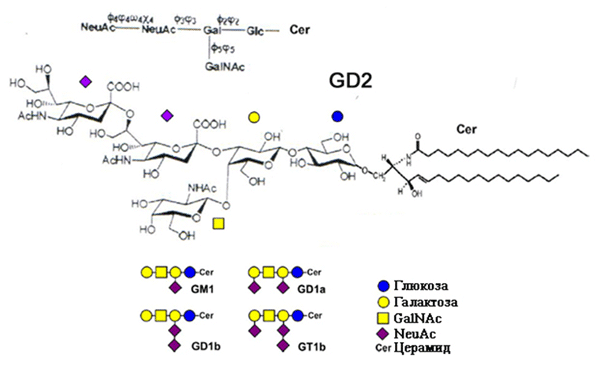Press-room / news / Science news /
Ganglioside GD2 as a Key Tool Towards Novel Anti-Cancer Therapy
Besides proteins, glycosphingolipids and in particularly ganglioside GD2 can be treated as targets for anti-cancer therapy. It has been discovered that classic immune antitumor mechanisms are not exclusive (and probably are not the main) reasons of therapeutic activity of GD2-specific antibodies. In the study, carried out in the Group of molecular modulators of immunity in IBCh RAS, at the first time was proved unique property of ganglioside GD2 to activate “suicide” of tumor cells after it binding with GD2-specific antibodies. The project aimed to develop new anticancer drugs based on this study recently has received approval by the Skolkovo Foundation.
Gangliosides are very important membrane molecules (especially in brain tissues) that belong to glycosphingolipids family. These molecules concentrate in the synaptic area of neurons and in the growth cone of developing axons. The contents and metabolism of glycosphingolipids change permanently in dependence of intracellular processes. Such specific changes occur during the cell differentiation, division and embryonic brain development. But the most interesting changes of ganglioside composition take place in neoplastic transformation. The overexpression of GD2 is observed in 10% of all cancers, including neuroblastoma and smallcell lung cancer, relates to most dangerous tumor types, usually resistant to standard antitumor therapy. Recent studies revealed expression of GD2 on the cell surface of breast cancer stem cells. National Cancer Institute gave 12th position for GD2 in the list of 75 potential targets for anti-cancer therapy according to therapeutic potential, immunogenicity, expression degree and antigen-specific cells percentage. That’s why GD2 attract great attention of scientists and clinicians. About 20 drugs based on GD2 specific monoclonal antibodies or their derivatives now under clinic investigations, but the mechanisms of their functional activities have not clarified completely.

Figure 1. Gangliosides structure.
The study conducted in IBCH RAS by scientific group Doronin I.I., Vishnyakova P.A., Kholodenko I.V., Ponomarev E.D., Ryazantcev D.U., Molotkovskaya I.M., Kholodenko R.V. and published in BMC Cancer journal in spring 2014 (1) open new mechanisms of tumor cell death. These mechanisms are related to the ability of ganglioside GD2 to transmit the cell death signal inside tumor cells. The direct binding of GD2-specific antibodies to GD2 causes tumor cell death. Interestingly, the mechanisms of such cell death combine apoptotic and necrotic features: they include changes of mitochondrial membrane potential, apoptotic volume decrease and formation of membrane pores. Cytotoxic effects are mediated exclusively by specific binding of anti-GD2 antibodies to ganglioside GD2, but not to any other molecular structures on the membrane surface. Furthermore, the GD2 expression level correlates with tumor cell’s response for the cytotoxic action mediated by anti-GD2 antibodies.
The results of this study demonstrate that anti-GD2 antibodies not only bind to the tumor cells surface, but directly initiate quick cell death, which potentially could lead to disease remission. These results and our previous data indicate that fragments of GD2-specific antibodies retain cytotoxic activity of full-length immunoglobulins (2), open new approaches for anti-cancer therapies. Developing worldwide drugs based on full-length GD2-specific antibodies have number of limitations. Immune mechanisms associated with Fc-fragments of antibodies have non-sufficient anti-cancer activity and strong side effects (hyperactivation of immune system, neurotoxicity etc). GD2-binding fragments of monoclonal antibodies retained effector activity and will have fewer side effects because of absence of Fc-fragment.
The development project of modified fragments of GD2-specific antibodies with anti-tumor activity became as a prizewinner of awards FANO together with Skolkovo Foundation and in the contest OncoBioMed 2014, provided by Skolkovo Foundation within XVIII Russian Oncologic Congress (3, 4).

Figure 2. IBCh employees Kholodenko R.V. and Doronin I.I. at the awards ceremony of Open Innovations 2014 contest and XVIII Russian Oncology Congress.
References
- Doronin I.I., Vishnyakova P.A., Kholodenko I.V., Ponomarev E.D., Ryazantsev D.Y., Molotkovskaya I.M., Kholodenko R.V. (2014). Ganglioside GD2 in reception and transduction of cell death signal in tumor cells. BMC Cancer 14, 295;
-
Doronin I.I., Kholodenko I.V., Molotkovskaya I.M., Kholodenko R.V. (2013). Preparation of Fab-fragments of GD2-specific antibodies and analysis of their antitumor activity in vitro. Bull. Exp. Biol. Med. 154,
658–663. - Skolkovo Foundation News: Final competition of OncoBioMed-2014 and XVIII Oncologic congress (article in Russian);
- Skolkovo Foundation News: Contest of FANO and Skolkovo: winners are named (article in Russian).
november 27, 2014

